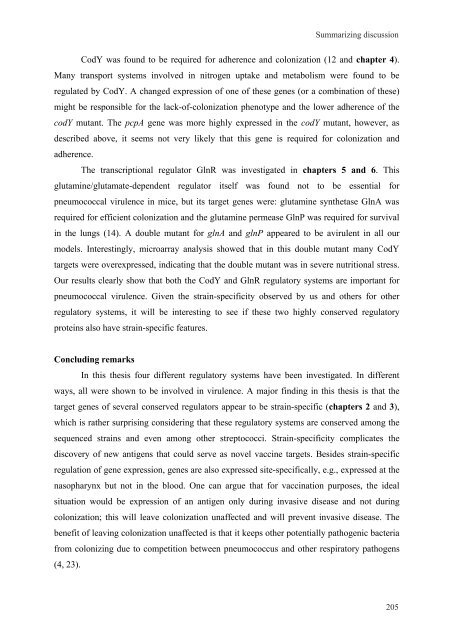Gene regulation in Streptococcus pneumoniae - RePub - Erasmus ...
Gene regulation in Streptococcus pneumoniae - RePub - Erasmus ...
Gene regulation in Streptococcus pneumoniae - RePub - Erasmus ...
You also want an ePaper? Increase the reach of your titles
YUMPU automatically turns print PDFs into web optimized ePapers that Google loves.
CodY was found to be required for adherence and colonization (12 and chapter 4).<br />
Many transport systems <strong>in</strong>volved <strong>in</strong> nitrogen uptake and metabolism were found to be<br />
regulated by CodY. A changed expression of one of these genes (or a comb<strong>in</strong>ation of these)<br />
might be responsible for the lack-of-colonization phenotype and the lower adherence of the<br />
codY mutant. The pcpA gene was more highly expressed <strong>in</strong> the codY mutant, however, as<br />
described above, it seems not very likely that this gene is required for colonization and<br />
adherence.<br />
Summariz<strong>in</strong>g discussion<br />
The transcriptional regulator GlnR was <strong>in</strong>vestigated <strong>in</strong> chapters 5 and 6. This<br />
glutam<strong>in</strong>e/glutamate-dependent regulator itself was found not to be essential for<br />
pneumococcal virulence <strong>in</strong> mice, but its target genes were: glutam<strong>in</strong>e synthetase GlnA was<br />
required for efficient colonization and the glutam<strong>in</strong>e permease GlnP was required for survival<br />
<strong>in</strong> the lungs (14). A double mutant for glnA and glnP appeared to be avirulent <strong>in</strong> all our<br />
models. Interest<strong>in</strong>gly, microarray analysis showed that <strong>in</strong> this double mutant many CodY<br />
targets were overexpressed, <strong>in</strong>dicat<strong>in</strong>g that the double mutant was <strong>in</strong> severe nutritional stress.<br />
Our results clearly show that both the CodY and GlnR regulatory systems are important for<br />
pneumococcal virulence. Given the stra<strong>in</strong>-specificity observed by us and others for other<br />
regulatory systems, it will be <strong>in</strong>terest<strong>in</strong>g to see if these two highly conserved regulatory<br />
prote<strong>in</strong>s also have stra<strong>in</strong>-specific features.<br />
Conclud<strong>in</strong>g remarks<br />
In this thesis four different regulatory systems have been <strong>in</strong>vestigated. In different<br />
ways, all were shown to be <strong>in</strong>volved <strong>in</strong> virulence. A major f<strong>in</strong>d<strong>in</strong>g <strong>in</strong> this thesis is that the<br />
target genes of several conserved regulators appear to be stra<strong>in</strong>-specific (chapters 2 and 3),<br />
which is rather surpris<strong>in</strong>g consider<strong>in</strong>g that these regulatory systems are conserved among the<br />
sequenced stra<strong>in</strong>s and even among other streptococci. Stra<strong>in</strong>-specificity complicates the<br />
discovery of new antigens that could serve as novel vacc<strong>in</strong>e targets. Besides stra<strong>in</strong>-specific<br />
<strong>regulation</strong> of gene expression, genes are also expressed site-specifically, e.g., expressed at the<br />
nasopharynx but not <strong>in</strong> the blood. One can argue that for vacc<strong>in</strong>ation purposes, the ideal<br />
situation would be expression of an antigen only dur<strong>in</strong>g <strong>in</strong>vasive disease and not dur<strong>in</strong>g<br />
colonization; this will leave colonization unaffected and will prevent <strong>in</strong>vasive disease. The<br />
benefit of leav<strong>in</strong>g colonization unaffected is that it keeps other potentially pathogenic bacteria<br />
from coloniz<strong>in</strong>g due to competition between pneumococcus and other respiratory pathogens<br />
(4, 23).<br />
205<br />
205

















